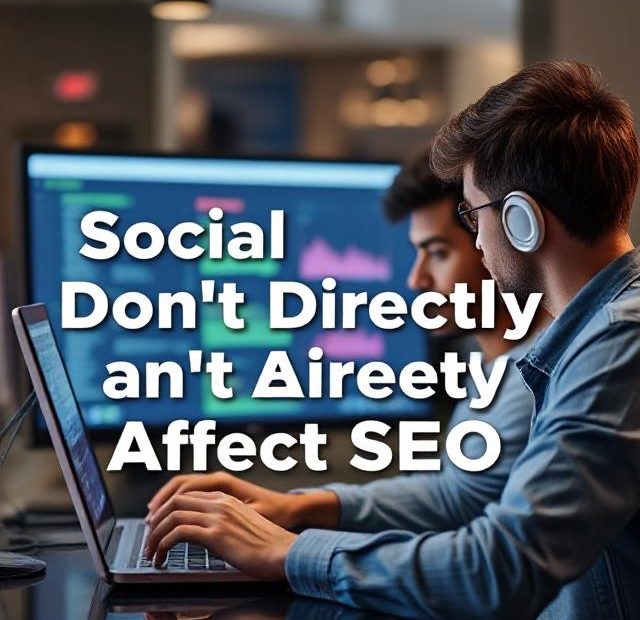For years, digital marketers have debated the role of social media in search engine optimization (SEO). Some claim that Facebook likes, retweets, and Instagram shares directly boost a site’s rankings. Others argue that social signals have zero impact on SEO.
So, what’s the truth?
Despite what many believe, social signals don’t directly influence Google’s search rankings. That means your number of followers, shares, or likes isn’t a direct ranking factor in the search algorithm.
But that doesn’t mean social media is irrelevant to SEO. In fact, social activity can still indirectly support your SEO strategy in powerful ways.
Let’s explore why social signals don’t count as direct ranking factors, what Google officially says about them, and how to use social media to benefit your SEO efforts anyway.
What Are Social Signals?
Social signals refer to measurable engagement metrics on social media platforms. These include:
-
Facebook likes and shares
-
Twitter retweets
-
Instagram likes and comments
-
LinkedIn shares
-
Pinterest pins
-
Reddit upvotes and threads
These metrics reflect how people interact with your content socially. Naturally, many assumed that search engines would use this data to judge a page’s value—after all, if a blog post has thousands of likes, isn’t it clearly valuable?
It’s not that simple.
Google’s Official Stance on Social Signals
Google has publicly stated multiple times that social signals are not a direct ranking factor. In a past interview, former Google engineer Matt Cutts confirmed that Google does not include Facebook or Twitter shares in its ranking algorithm. That position remains consistent today.
Here’s why:
1. Data Inconsistency
Social media platforms often change how they expose data. APIs get restricted, data disappears, or privacy policies shift—making it unreliable for long-term algorithm use.
2. Easy Manipulation
It’s relatively easy to fake social proof. You can buy likes, followers, and shares from black-hat providers. Google avoids using easily manipulated signals for rankings.
3. Crawlability Issues
Search engines may not always be able to crawl all social media content—especially private profiles or closed groups. Relying on signals they can’t access reliably would be problematic.
So… Does Social Media Help SEO at All?
Absolutely. While it doesn’t directly boost your Google rankings, social media plays a significant indirect role in SEO success.
Here’s how:
1. Increases Content Visibility
When you share content on social platforms, you open it up to larger audiences. If your blog post gets shared widely, it could reach journalists, bloggers, or industry experts who link back to it.
And backlinks are a known ranking factor.
In that sense, social media acts as a distribution engine that amplifies your content’s chances of earning quality inbound links.
2. Boosts Brand Awareness
The more people recognize your brand on social media, the more likely they are to search for it. Branded search volume—when people Google your brand name—can improve your SEO over time by signaling trust and authority.
3. Encourages Longer Content Lifespan
Without social sharing, most content dies quickly. But one tweet or Reddit thread can bring old blog posts back to life. That continued traffic helps keep pages indexed and active in Google’s view.
4. Drives Traffic and Engagement
While social media traffic is typically considered “referral” rather than “organic,” it still boosts engagement metrics like time on site, bounce rate, and page views—all of which can correlate with better rankings when paired with good content.
5. Improves Indexation Speed
Sharing new content on social platforms may help search engines discover and crawl it faster. When content gets buzz, it’s more likely to be picked up by bots scanning the web.
The Right Way to Use Social Media for SEO
If you want social media to boost your SEO indirectly, here’s what to focus on:
✅ Create High-Value, Shareable Content
The better your content, the more likely people are to share it. Use attention-grabbing headlines, clean visuals, and digestible formats like listicles, infographics, or tutorials.
✅ Encourage Natural Sharing
Don’t beg for likes or game the system. Make it easy for users to share your content by adding social share buttons and engaging CTAs.
✅ Engage with Influencers and Communities
Build relationships in your niche. When influencers share your content, it reaches a broader audience, increasing the chances of backlinks and media mentions.
✅ Track What Works
Use tools like Google Analytics and UTM codes to measure which social channels drive the most valuable traffic to your website.
What About Bing?
It’s worth noting that Bing (Microsoft’s search engine) has historically admitted to using some social signals as part of its ranking algorithm. So, while Google doesn’t count them directly, Bing might—but even then, it’s only one of many minor factors.
Still, because Google controls the vast majority of search traffic, marketers should focus on the indirect benefits rather than hoping for a direct ranking lift from social metrics.
Final Thoughts
The myth that “more likes equals higher rankings” needs to be retired. Social signals don’t directly impact your position in Google search results. But that doesn’t mean you should ignore social media—it’s a powerful tool for visibility, branding, and link acquisition.
Think of social media as a catalyst, not a ranking factor. It doesn’t change your SEO status on its own, but it can influence the signals that do matter—like backlinks, engagement, and traffic.
So go ahead, keep tweeting, posting, and pinning. Just don’t expect your SEO to improve overnight because of it.
Also, you can learn more about Duplicate Content here.
